
As you contemplate the changing seasons and their impact on emu health, consider the pivotal role of proper care routines. Seasonal adjustments go beyond mere routine; they can be the difference between thriving emus and those facing health challenges. From diet modifications to feather care, each aspect plays a crucial role in maintaining their well-being. By exploring the nuances of seasonal care for emus, you'll uncover a wealth of knowledge to ensure their health and vitality year-round.
Key Takeaways
- Adjust diet for high protein in warmer months and more fats/carbs in winter.
- Provide clean, fresh water daily; adjust intake based on temperature/activity.
- Regulate temperature with shaded areas in hot weather and shelters in cold spells.
- Maintain healthy feathers with regular inspections, dust baths, and balanced diet.
- Prevent parasites through deworming, fecal tests, clean living areas, and pasture rotation.
Seasonal Diet Adjustments
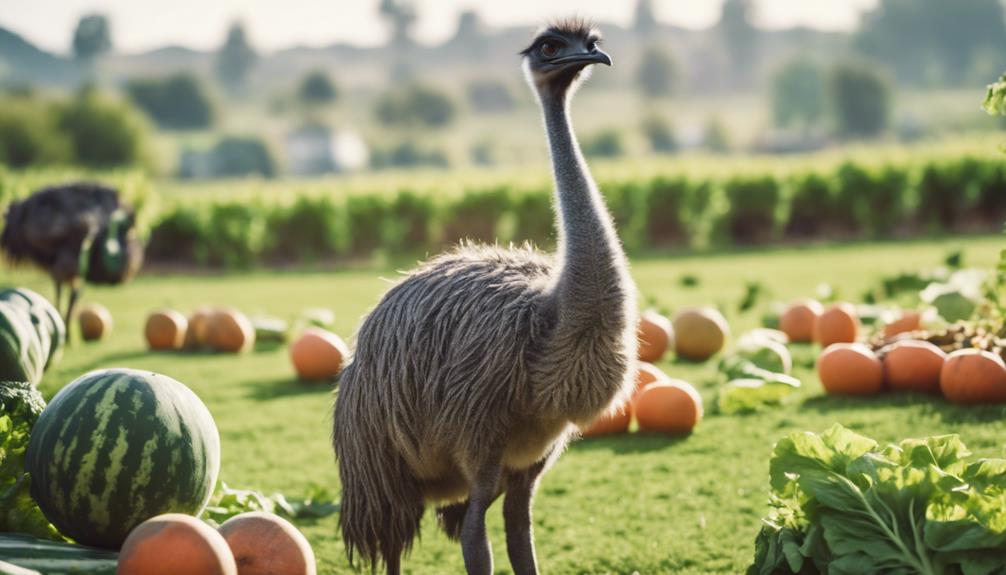
Adjusting your emu's diet according to the seasons is crucial for maintaining their health and well-being throughout the year. Emus are hardy birds, but their dietary needs change with the shifting seasons. During the warmer months, when emus are more active, their diet should consist of high-protein foods like insects, seeds, and green vegetation. This will help support their energy levels and muscle development as they roam and explore their surroundings.
As the temperatures drop and winter approaches, it's essential to adjust their diet to provide more fats and carbohydrates. This can include grains, nuts, and even some fruits to help them maintain their weight and energy during the colder months when food may be scarcer. Ensuring your emu has a well-balanced diet tailored to the seasons will help prevent health issues and keep them strong and thriving year-round. Remember, a well-fed emu is a powerful and resilient emu.
Watering Needs
To ensure optimal health for your emus, it's important to understand their watering needs throughout the year. Emus are large birds that require a significant amount of water daily, especially during hot weather or when they're breeding. Providing access to clean, fresh water at all times is crucial for their well-being. Emus will drink varying amounts depending on the temperature and their activity levels, so monitoring their water intake is essential.
During the hotter months, emus may drink more water to stay hydrated and regulate their body temperature. It's recommended to have multiple water sources available in different areas of their enclosure to prevent overcrowding and ensure all emus have access. Regularly check the water sources to ensure they're clean and free of contaminants that could harm your emus.
In colder weather, it's equally important to monitor their water intake, as emus can still become dehydrated even when it's cold. Make sure the water doesn't freeze, and provide lukewarm water if needed. By understanding and meeting your emus' watering needs year-round, you can help them stay healthy and thrive.
Temperature Regulation
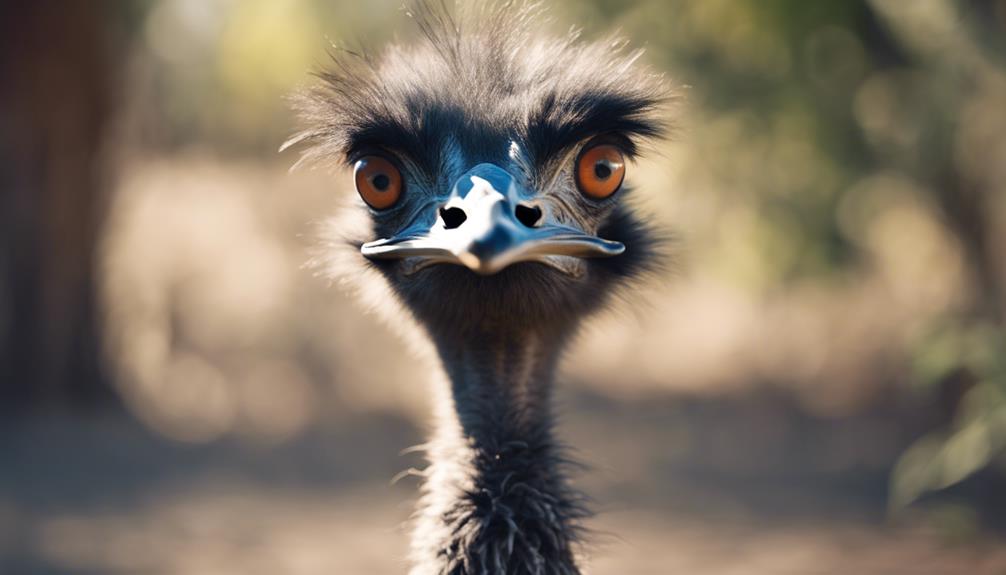
Understanding how emus regulate their body temperature is key to ensuring their health and well-being throughout the year. Emus have unique adaptations to cope with temperature changes. In hot weather, emus dissipate heat through their bare skin on the neck and legs, allowing for efficient cooling. They can also pant and adjust their posture to reduce sun exposure. During cold periods, emus fluff up their feathers to trap heat close to their bodies. Understanding these mechanisms is crucial for providing proper environmental conditions for your emus.
To aid their temperature regulation, ensure your emus have access to shaded areas during hot days and shelters during cold spells. Monitor their behavior; if they're panting excessively or shivering, adjust their environment accordingly. Maintaining a comfortable temperature range is essential for the overall health and productivity of your emus. By attending to their temperature needs, you empower your emus to thrive in various weather conditions.
Feather Care
Proper feather care is essential for maintaining the health and well-being of your emus. Emus rely on their feathers for insulation, protection, and display. Regularly inspect your emus' feathers for signs of damage, such as broken or missing feathers, which can compromise their ability to regulate body temperature and protect themselves from the elements.
To care for your emus' feathers, provide them with a clean and dry environment to prevent feather degradation and fungal infections. Dust baths can help emus maintain clean feathers and reduce oil buildup, promoting healthy feather growth. Additionally, ensure your emus have access to a balanced diet rich in essential nutrients like protein and omega-3 fatty acids to support feather health.
During molting seasons, handle your emus with care to avoid causing discomfort or damaging new feather growth. Gently remove any loose or stuck feathers to prevent potential issues like feather cysts. By prioritizing feather care, you contribute to your emus' overall health and vitality.
Parasite Prevention
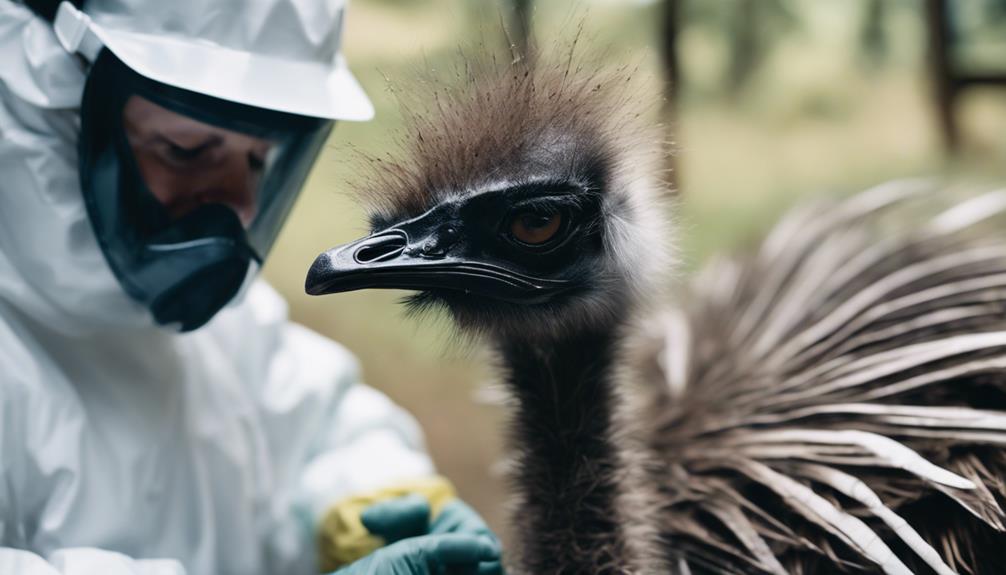
Maintaining a regular schedule for deworming and monitoring your emus' fecal samples is crucial for effective parasite prevention. Parasites can negatively impact the health and well-being of your emus, leading to issues such as weight loss, decreased egg production, and overall decreased performance. By staying proactive and implementing a strategic parasite prevention plan, you can ensure that your emus remain healthy and productive.
To help you stay organized and on top of your emus' parasite prevention needs, here is a helpful table outlining key aspects of parasite prevention:
| Aspect | Description |
|---|---|
| Deworming Schedule | Establish a regular deworming schedule with guidance from a vet. |
| Fecal Sample Tests | Regularly collect and test fecal samples to monitor parasite presence. |
| Pasture Management | Rotate pastures regularly to help reduce parasite contamination. |
| Cleanliness | Keep living areas clean and dry to minimize parasite infestation risk. |
Shedding Season Tips
For optimal care during shedding season, it's essential to implement a grooming routine that targets loose feathers and promotes healthy skin and feather regrowth. Shedding is a natural process for emus, but proper care can help them through this phase smoothly.
Here are some tips to assist you in managing shedding season effectively:
- Regular Grooming: Brush your emus regularly to remove loose feathers and debris.
- Balanced Diet: Ensure your emus are receiving a diet rich in essential nutrients to support healthy feather regrowth.
- Hydration: Provide ample water to keep your emus hydrated, aiding in the health of their skin and feathers.
- Dust Baths: Offer dust baths to help your emus naturally clean their feathers and skin.
- Monitor Skin Health: Keep an eye on your emus' skin condition during shedding season, looking out for any signs of irritation or infection.
Exercise Requirements
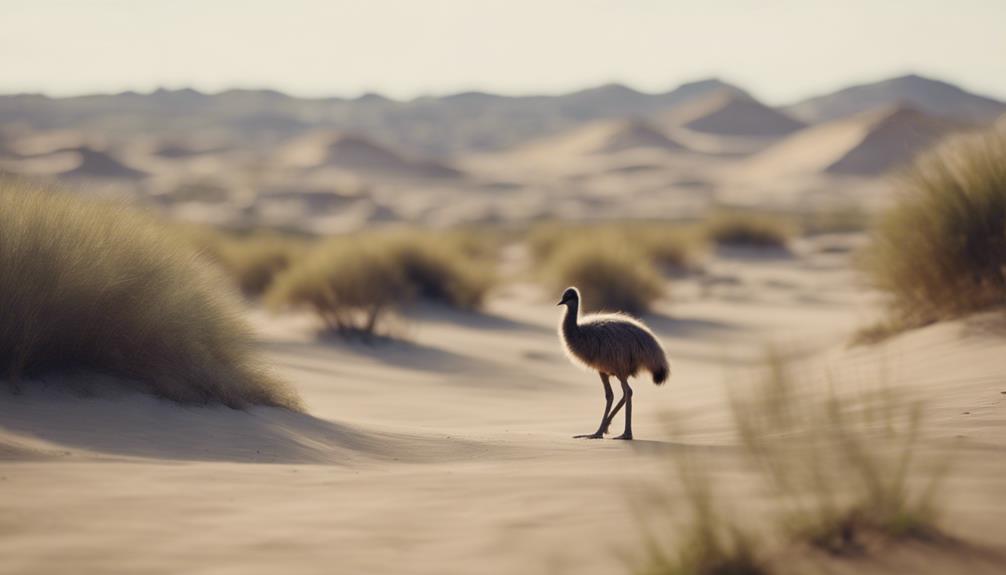
During shedding season, ensuring your emus engage in appropriate exercise is vital for their overall health and well-being. Emus are naturally active birds that require ample space to roam, run, and stretch their legs. Providing your emus with a large, fenced area is essential for allowing them to fulfill their exercise needs. Encouraging activities such as walking, running, and even occasional sprinting will help maintain their muscle tone and cardiovascular health.
Regular exercise also aids in preventing obesity, a common issue in captive emus. Obesity can lead to various health problems, including joint issues and decreased reproductive success. By incorporating exercise into their daily routine, you're promoting not only physical health but also mental well-being. Emus thrive on stimulation and the freedom to move around, so ensuring they have opportunities for exercise is crucial for their overall quality of life.
Remember to observe your emus while they exercise to ensure they aren't overexerting themselves, especially during hot weather. Providing access to shade and fresh water at all times is essential for their comfort and safety during physical activity. By prioritizing exercise for your emus, you're investing in their long-term health and happiness.
Breeding Considerations
To ensure successful breeding of emus, it's crucial to carefully consider various factors that impact their reproductive health and overall well-being. Emus are unique creatures with specific requirements for successful breeding. Here are some essential breeding considerations:
- Diet: Providing a balanced diet rich in nutrients is crucial for optimal breeding conditions.
- Habitat: Creating a suitable environment that mimics their natural habitat can encourage breeding behavior.
- Pairing: Selecting compatible pairs based on temperament and health can improve breeding success rates.
- Monitoring: Regularly monitoring the breeding pairs for any signs of aggression or health issues is essential.
- Consultation: Seeking advice from experienced breeders or veterinarians can offer valuable insights into optimizing the breeding process.
Mating Season Precautions
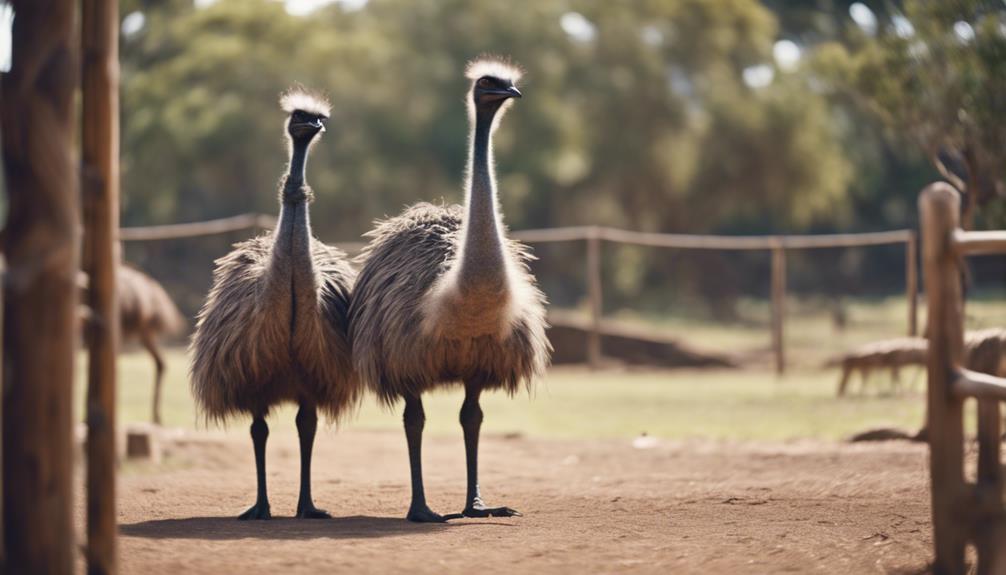
As you prepare for the upcoming mating season with your emus, it is vital to implement specific precautions to safeguard their health and enhance breeding outcomes. Ensuring a suitable environment, monitoring behavioral changes, and providing proper nutrition are essential steps to take during this critical period.
—
| Precaution | Description | Purpose |
|---|---|---|
| Environmental Assessment | Evaluate the emus' living space for safety hazards and adequate nesting areas. | Create a conducive environment for mating. |
| Behavior Monitoring | Observe mating behaviors and interactions to detect any signs of aggression. | Prevent injuries and ensure successful mating. |
| Nutritional Adjustment | Adjust the emus' diet to include essential nutrients for optimal breeding. | Support reproductive health and egg production. |
—
Emu Chicks Care
Ensure the optimal development and well-being of emu chicks by implementing proper care practices from hatching to maturity. Emu chicks require attentive care to thrive and reach their full potential. Here are some essential guidelines to consider:
- Brooding Conditions: Provide a warm and dry brooding area with proper ventilation to maintain a comfortable environment for the chicks.
- Nutritional Needs: Feed emu chicks with a balanced diet rich in protein, vitamins, and minerals to support their growth and development.
- Hydration: Ensure access to clean water at all times to prevent dehydration, especially during hot weather.
- Health Monitoring: Regularly check the chicks for any signs of illness or injury, and promptly address any concerns to maintain their well-being.
- Socialization: Encourage healthy social interactions among the chicks to prevent stress and promote their overall mental and emotional health.
Molting Management
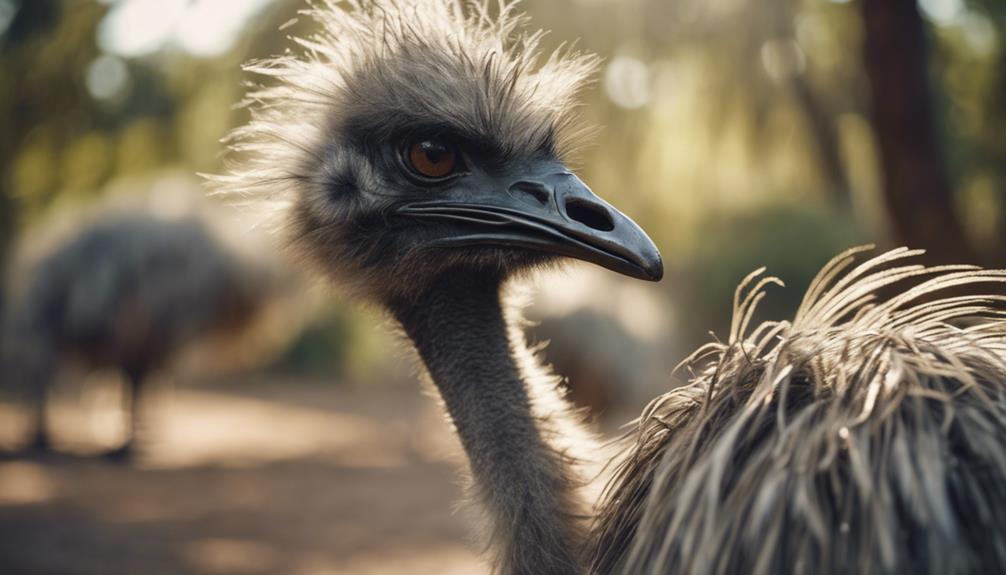
Maintaining healthy feathers is vital for the overall well-being of your emus, especially during molting seasons. Molting, the natural process of shedding old feathers to make way for new ones, is crucial for your emus to stay healthy and regulate their body temperature efficiently.
To manage molting effectively, ensure your emus have access to a well-balanced diet rich in protein, vitamins, and minerals to support feather growth. Additionally, provide a stress-free environment with ample space for your emus to move around comfortably, reducing the likelihood of feather damage during this sensitive period.
Regularly inspect your emus for any signs of feather abnormalities or skin irritations, as these could indicate underlying health issues that need attention. Gentle grooming and dust baths can also help your emus alleviate itching and discomfort during molting.
Seasonal Shelter Maintenance
For optimal seasonal shelter maintenance, prioritize inspecting and repairing any structural damages promptly. This proactive approach ensures a safe and comfortable environment for your emus throughout the changing seasons. Here are five key tasks to focus on:
- Check Roof Integrity: Inspect for leaks, loose shingles, or signs of wear that could compromise protection from the elements.
- Secure Fencing: Ensure that all fencing is intact and sturdy to prevent escapes and protect emus from predators.
- Evaluate Ventilation: Assess airflow to maintain proper ventilation without exposing emus to drafts or temperature extremes.
- Clean Water Systems: Regularly clean and check water supply systems to guarantee a fresh and reliable water source.
- Inspect Flooring: Examine flooring for wear, rot, or damage to provide a comfortable and hygienic space for your emus.
Frequently Asked Questions
How Can I Help My Emu Adjust to Seasonal Changes in Daylight?
To help your emu adjust to seasonal changes in daylight, gradually alter their light exposure by adjusting their coop lighting. Mimic natural light patterns to ease the transition. This will help regulate their internal clock and ensure they remain healthy.
Are There Specific Supplements Needed for Emus During Seasonal Transitions?
To ensure optimal health during seasonal transitions, you should consider specific supplements for your emus. Consult a veterinarian to determine the right balance of nutrients for their needs. Adapting their diet can help support their well-being.
What Are the Signs of Stress in Emus During Seasonal Changes?
You can spot signs of stress in emus during seasonal changes by observing changes in their behavior like increased aggression, restlessness, decreased appetite, and feather plucking. Addressing these signs promptly is crucial for their well-being.
Can Emus Be Affected by Seasonal Allergies or Sensitivities?
Yes, emus can be affected by seasonal allergies or sensitivities. Pollen, dust, and mold spores are common triggers. Watch for symptoms like sneezing, itching, or watery eyes. Consulting a vet for proper diagnosis and treatment is essential.
How Can I Prevent Emus From Overexerting Themselves in Extreme Temperatures?
To prevent emus from overexerting in extreme temperatures, ensure ample shade, ventilation, and access to cool water. Emus can't sweat and regulate temperature through panting. Monitor them closely during heatwaves. Keep them stress-free for optimal health and productivity.
Conclusion
In conclusion, proper seasonal care is crucial for maintaining the health and well-being of emus. By adjusting their diet, providing clean water, regulating temperatures, and preventing parasites, emus can thrive throughout the year.
For example, a breeder in Australia noticed a significant improvement in their emus' overall health and productivity after implementing a seasonal care plan, resulting in stronger, healthier birds and increased breeding success.
Remember, seasonal care is key to ensuring the longevity and vitality of your emus.




